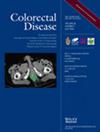Longitudinal quality of life assessment after laparoscopic colorectal cancer surgery using the Gastrointestinal Quality of Life Index questionnaire: A multicentre prospective study
Abstract
Aim
The aim of this study was to validate the Gastrointestinal Quality of Life Index (GIQLI) and assess its effectiveness in measuring changes in postoperative quality of life (QOL) after laparoscopic colorectal cancer surgery, including factors affecting early QOL impairment.
Method
This multicentre prospective study enrolled patients who underwent laparoscopic colorectal cancer surgery between November 2021 and February 2023. Participants completed the GIQLI and European Organisation for Research and Treatment of Cancer Quality of Life Questionnaire for Colorectal Cancer (EORTC QLQ-CR29) questionnaires preoperatively and at 1 and 3 weeks, 6 months and 1 year postoperatively. We evaluated GIQLI reliability, identified risk factors associated with early postoperative QOL impairment and assessed longitudinal changes in QOL to determine the timing of postoperative recovery.
Results
The GIQLI showed high reliability, with a preoperative intraclass correlation coefficient of 0.930 (95% CI 0.899–0.951) and Cronbach alpha values >0.9 at all time points. The mean global GIQLI score decreased from 106.2 ± 14.7 preoperatively to 92.7 ± 15.2 at 1 week postoperatively (p < 0.001), recovered to 104.6 ± 13.8 at 6 months postoperatively (versus preoperatively, p > 0.99) and increased to 113.4 ± 13.3 at 1 year postoperatively (versus preoperatively, p < 0.001). Early T-stage (T1–2; OR 2.82, 95% CI 1.25–6.40, p = 0.013) and intra-abdominal drain use (OR 3.95, 95% CI 1.09–14.28, p = 0.036) were significant risk factors for substantial impairment of QOL at 1 week postoperatively. The predicted recovery period to 95% of preoperative QOL was 6.4 weeks (95% CI 6.00–8.30 weeks).
Conclusion
The GIQLI reliably assessed longitudinal changes in QOL after laparoscopic colorectal cancer surgery and demonstrated QOL recovery within 2 months postoperatively, providing guidance for patient counselling and optimizing postoperative care.

 求助内容:
求助内容: 应助结果提醒方式:
应助结果提醒方式:


